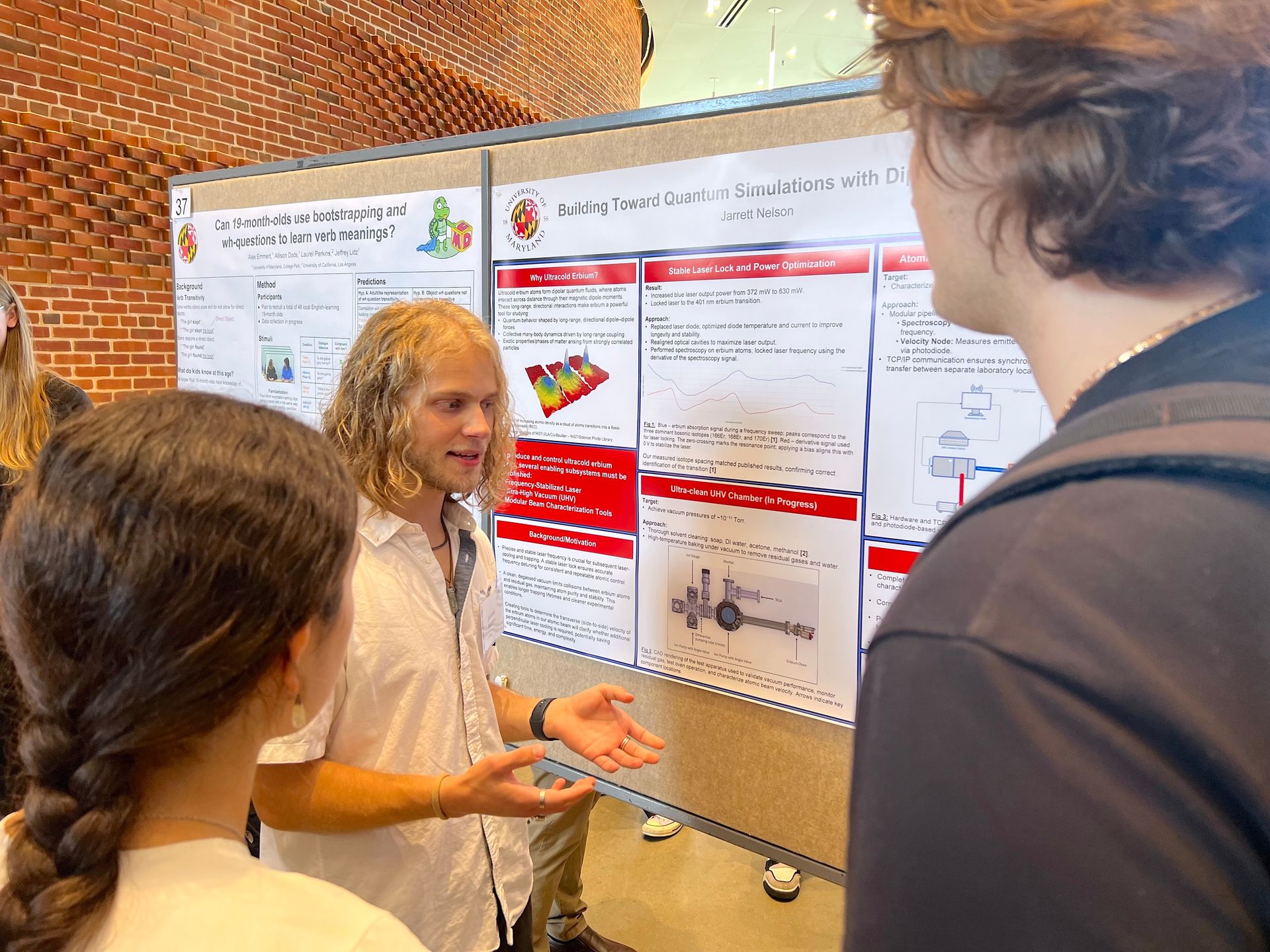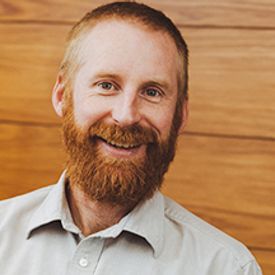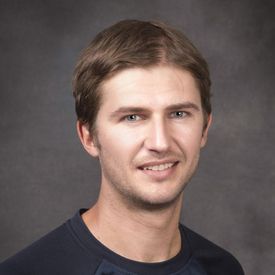REU Program Immerses Students in Interdisciplinary Quantum Simulation Research
August 8, 2025
Jarrett Nelson, a rising senior majoring in computer science and minoring in physics and math at Utah Valley University, explains his recent work involving quantum simulations using lasers at a poster session sponsored by the University of Maryland Office of Undergraduate Research. Nelson is one of eight undergraduates at UMD this summer as part of a 10-week research experience focusing on quantum.
The NSF Quantum Leap Challenge Institute for Robust Quantum Simulation (RQS) is hosting its first Research Experience for Undergraduates (REU) program this summer at the University of Maryland.
Supported by the National Science Foundation, the REU program focusing on quantum has brought eight undergraduates from across the country for a 10-week experience that connects them with quantum experts on the Maryland campus.
The students are working individually or in teams in projects that include quantum error correction, quantum thermodynamics, experimental physics, and theoretical computer science. In addition to cutting-edge research, the REU students are also participating in seminars, lectures and networking events on topics such as research ethics, applying for graduate school and career development tips.
Erin Sohr, a physics education researcher at UMD and the assistant director for education in RQS, is coordinating the quantum REU thrust, collaborating with faculty running several other REUs on campus this summer. She is excited that quantum was added to this year’s REU agenda, which also includes other groups working on topics like trustworthy AI, nonlinear dynamics, combinatorics and algorithms, and theoretical machine learning.
“We use quantum simulation to explore diverse scientific fields, which requires expertise across physics, computer science and engineering,” Sohr says. “RQS is uniquely positioned to tackle this complexity thanks to the strong community we’ve built over the past four years.”

She hopes this summer’s REU program will provide students with an “on-ramp” to enter and engage with the broader quantum ecosystem.
Jarrett Nelson, who will be a senior majoring in computer science this fall at Utah Valley University, says the quantum REU program has been a great learning experience.
Nelson is working on a project that involves implementing laser cooling and novel trapping techniques to cool dipolar erbium atoms. The goal, he says, is to “eventually be able to use these supercooled Erbium atoms to simulate complex materials and quantum systems that are too difficult to study directly.”
Nelson says that this work is somewhat out of his comfort zone, since he is more interested in theory-driven research, but the hands-on research using the RQS facilities has been invaluable.
“I come from a university with limited research opportunities, so I wanted to get out and gain firsthand experience in what conducting difficult research is really like,” he says.
Sohr says that while the REU program is challenging, UMD faculty and students involved are providing strong support for the visiting undergraduates.
“You’re taking students out of their home networks and placing them in an unfamiliar environment—often one that’s quiet or inactive during the summer—and expecting them to tackle difficult, unfamiliar work with people they’ve never met,” Sohr says. “They need strong support networks. That's just as much, if not more important than the research.”
The eight REU students focusing on quantum were matched with mentors—both graduate students and faculty—to help guide them throughout the experience.
Nelson said his experience with Ian Spielman, a physicist at the National Institute for Standards and Technology (NIST) and a senior investigator in RQS, has been “super helpful.”
“He’s willing to stay late to help explain things, because I'm not super familiar with the domain,” Nelson says. “I’ve spent a lot of time working alongside him, helping out and learning firsthand what he does day to day.”
Cassie Hopkin, a recent graduate of the University of California Davis who majored in computer science and mathematics, is working on a project involving quantum error correction.
Hopkin says she appreciates the weekly lectures, as they give her an opportunity to get an idea of the variety of areas within the program, as well as meet different professors.
Hopkin’s mentor for the summer is Victor Albert, who is also a physicist at NIST and a senior investigator in RQS.
Sohr says “success” for her and the RQS researchers involved means that the eight students completing the REU will come away feeling prepared, confident and ready to take the next steps in their academic journeys. Overall, she hopes to continue the quantum-focused REU long-term and enhance it for future students.
“My first thought is, how can we grow?” Sohr asks. “I’d love to see us build stronger connections with the quantum simulation industry and attract students from a broader range of backgrounds.”
—Story by Zsana Hoskins, UMIACS communications group
Experts
People
![a photo of a smiling man with a beard]()
![]()
Erin Sohr
Assistant Director for Education
![Profile photo of Victor Albert]()



